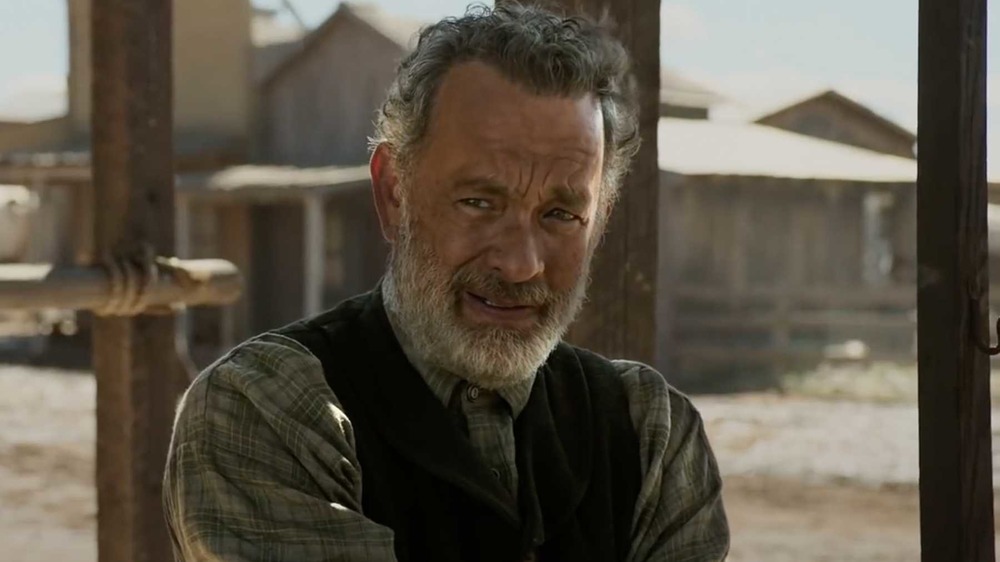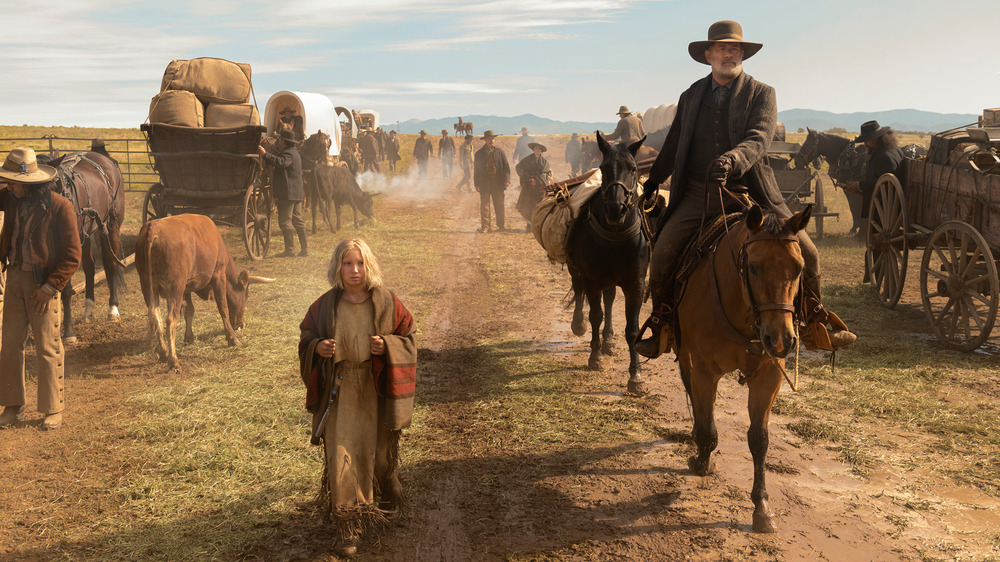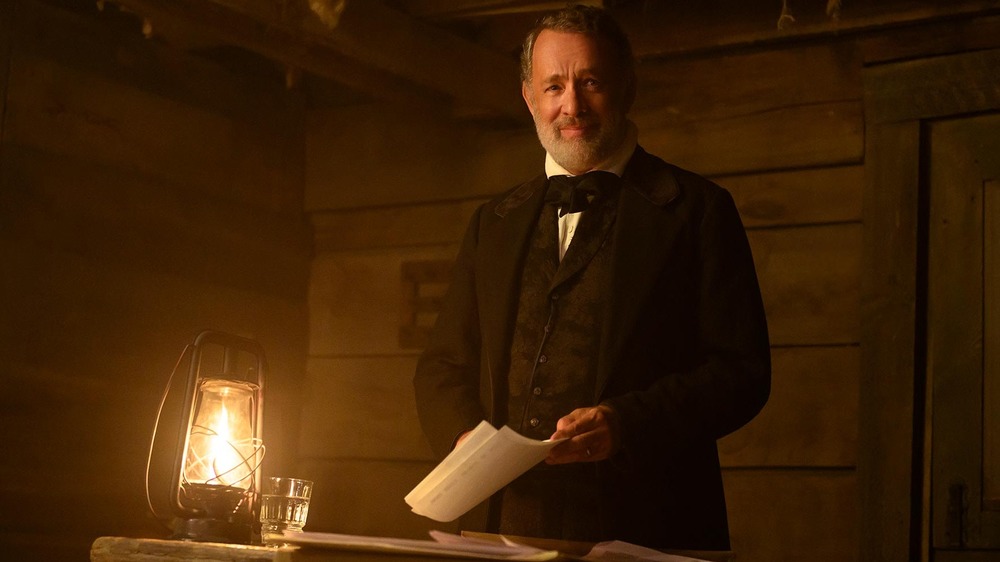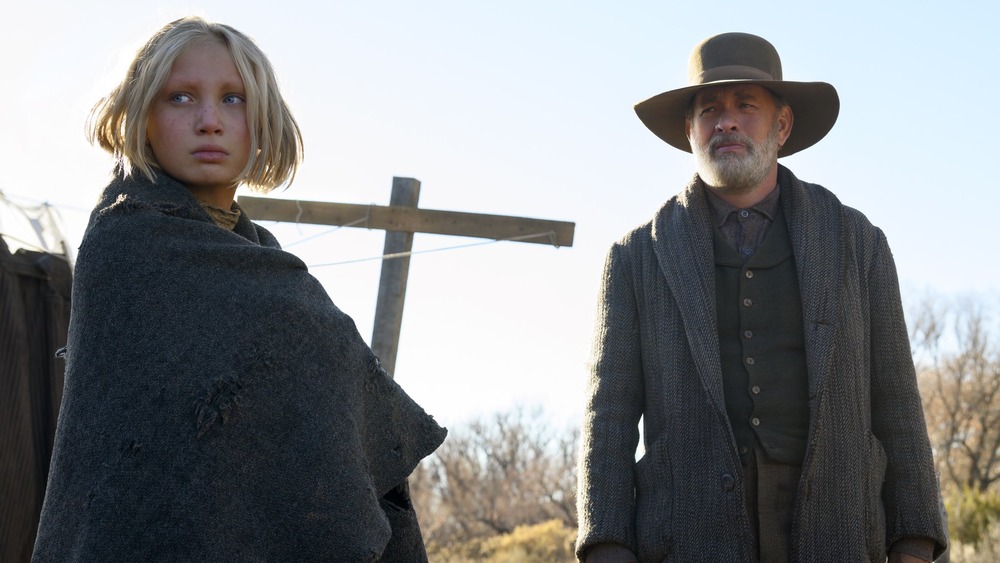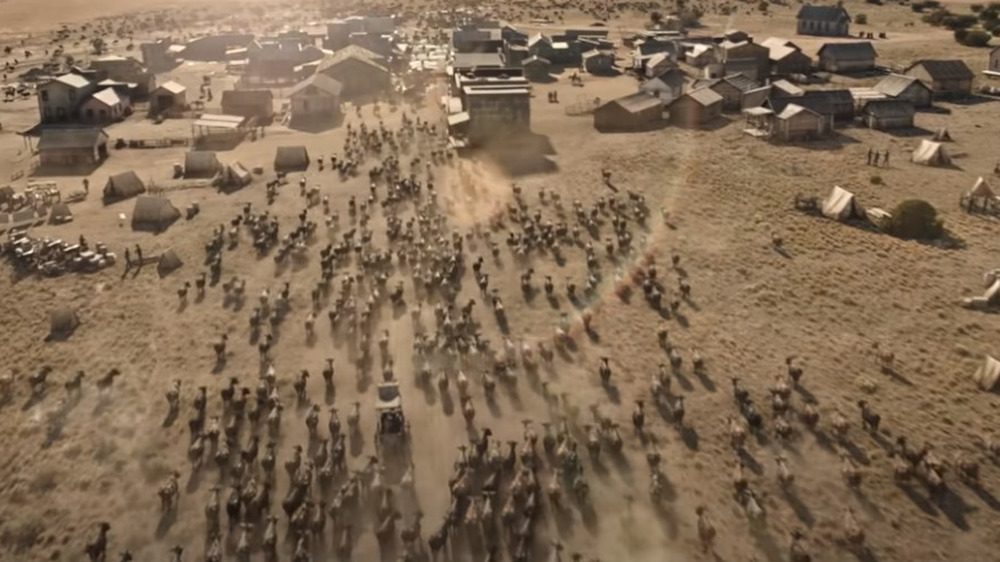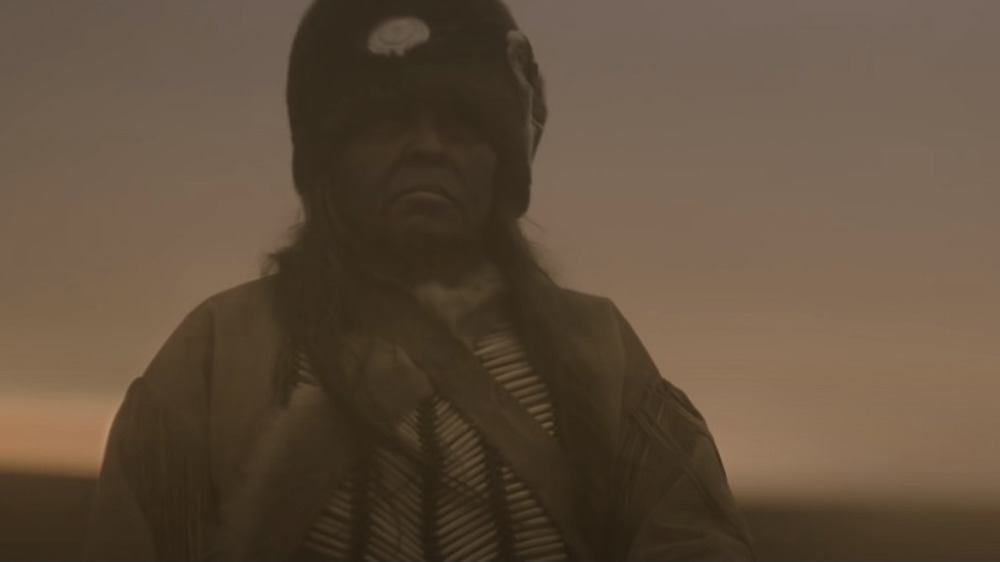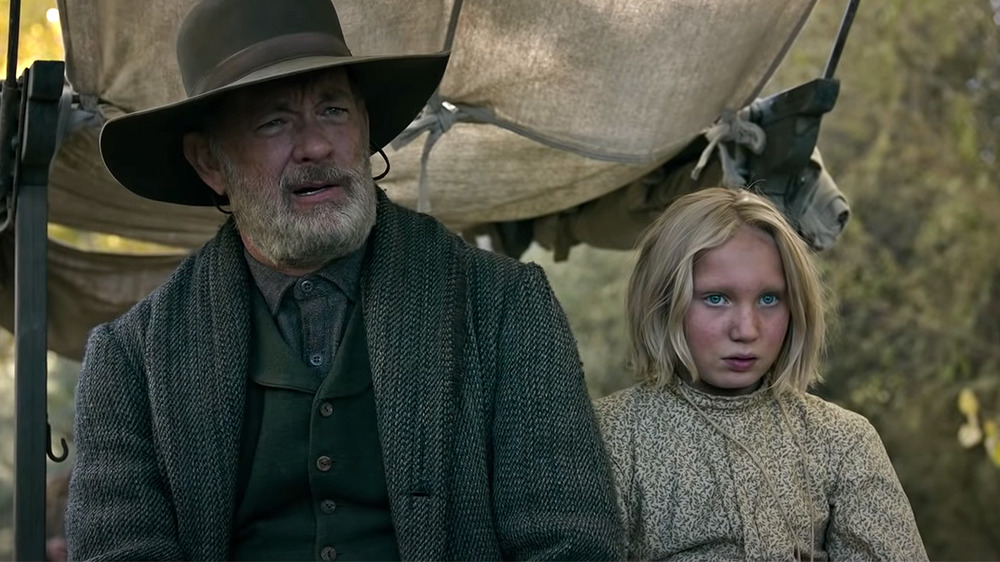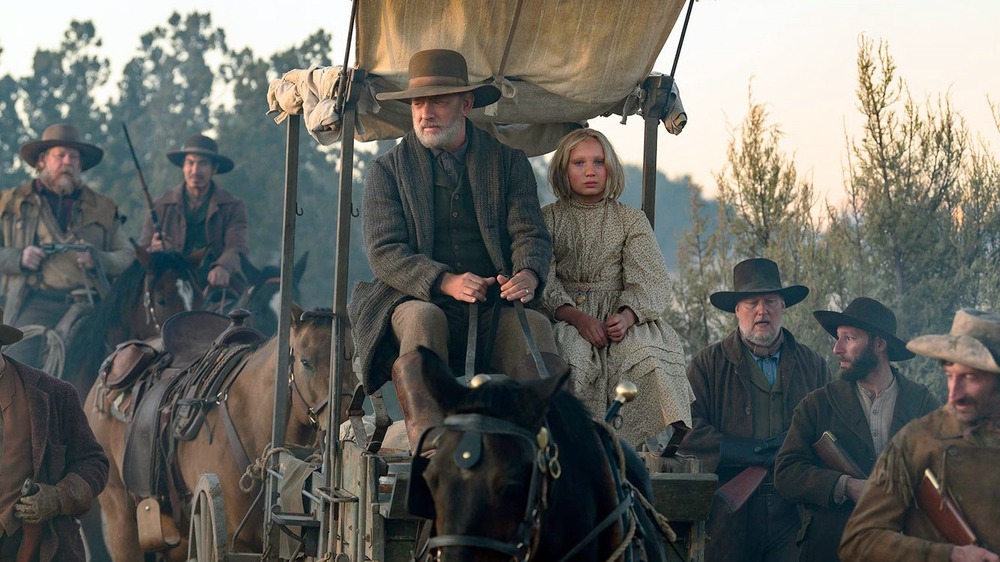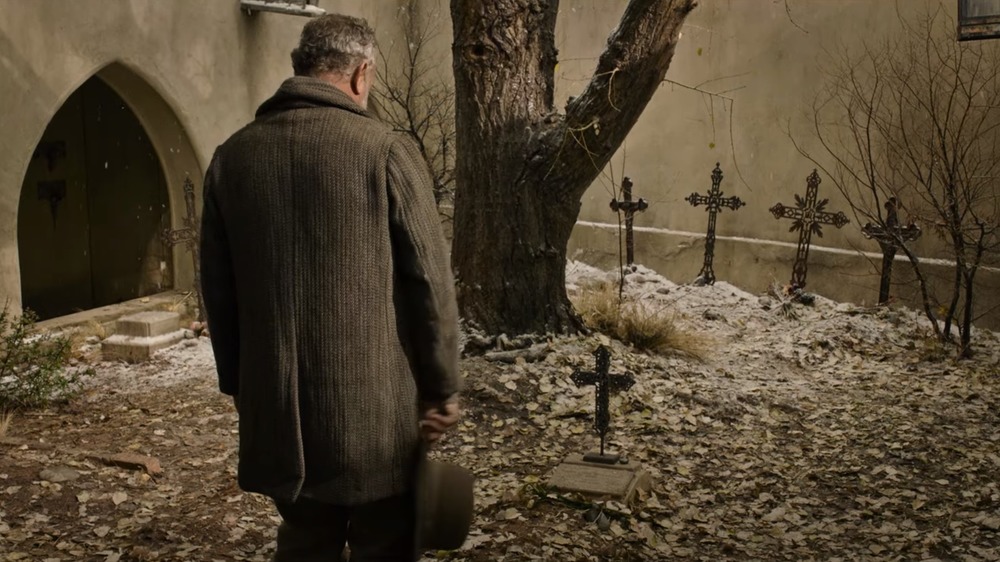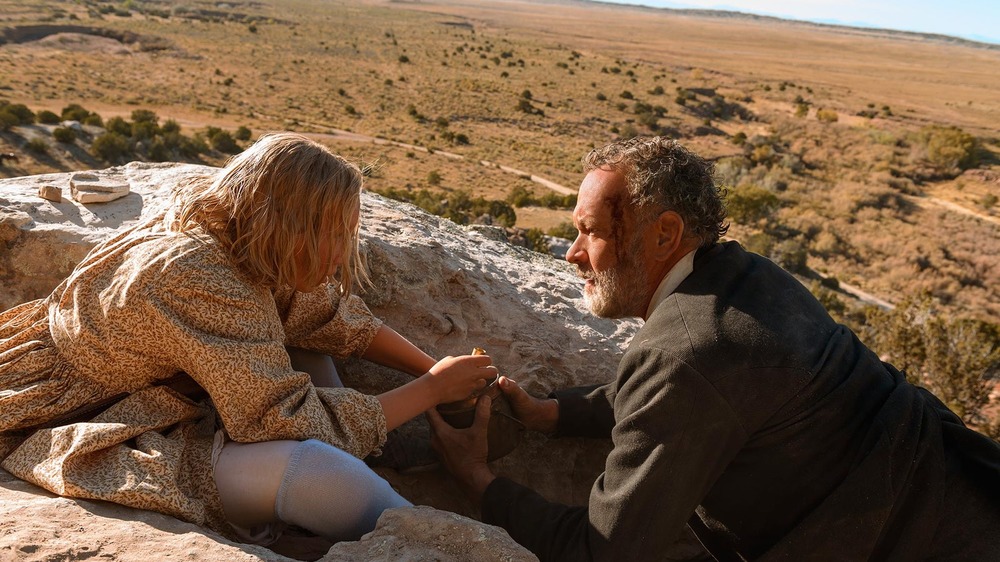The Ending Of News Of The World Explained
Tom Hanks is a master of soulful, vulnerable performances depicting the lives of men burdened with grave emotional challenges. Whether he's storming Omaha Beach in Saving Private Ryan, staring down pirates in Captain Phillips, or sinking German U-boats in Greyhound, he can always be counted on to find the human connections at the heart of the action.
That talent has a particularly heavy role to play in News of the World, director Paul Greengrass' film about a Civil War veteran (Hanks) who decides to take a young orphan girl (Helena Zengel) across Texas in 1870 so she can be reunited with family members she's never known. What follows is a powerful, tense, often emotionally devastating journey carried by the two performances at its core. Because the story is so intimate and so well-told, there's no real confusion at the end of News of the World, but the various major character beats and themes are just beginning to be deconstructed. With that in mind, this is the end of News of the World explained.
Spoilers for News of the World ahead!
Kidd the Man
When we meet Captain Jefferson Kyle Kidd, he seems pleased enough with the work he's doing, but he also feels like a man a bit untethered from the world around him, as evidenced not just by his constant traveling but by his overall demeanor. As the film goes on, it becomes easier to understand why. Kidd feels robbed of the life he wanted, the life he'd hoped for and worked toward, as the Civil War ultimately took from him both his printing business and his wife, who died while he was off fighting for what turned out to be a surrender.
Over the course of News of the World, Kidd's relationship with Johanna helps to transform him into a man with something to care about again. He sees Johanna as not just a challenge he's eager to surmount, but an eager and curious spirit who complements his own desire to share his knowledge with the rest of the world. Together they form at first an unlikely and then an inseparable pair, until by the end she's a key part of his performances. We don't know what awaits them in the future, but it's clear from the film's final scene that Kidd is a changed man.
Kidd the storyteller
When we meet Kidd, he's making his living as a professional reader of news from around the state, country, and world, but his job is about more than merely reading from a newspaper. He's a performer, adding flourishes and context and timing to the stories he's reading, sensing the dynamic he has with his audience and adjusting the content to fit. He's a curator, an orator, and a showman, and his interest in the kinds of stories he wants to tell shifts along with the film, as he delivers everything from delightful romps to hard news.
So what does that mean for Kidd's professional future? By the end of the film he's happily news-reading with Johanna by his side, but he also mentions his past as the owner of a printing company, something it seems like he'd be very good at with the right financial backing. We know from history that men who get paid to deliver the news don't go away. They just evolve with the technology. So will Kidd evolve his news-reading to change with the times? Will he go back to printing? It's hard to say, but one thing is very clear: He's a born storyteller, and he won't be able to stop himself.
Johanna's future
The young girl known as Cicada to her Kiowa family and Johanna to her German family is an intriguing puzzle throughout News of the World, in no small part because she spends much of the movie communicating with the people around her only sporadically. And yet we do get to see an arc unfolding through her nonverbal communication as Johanna shifts from being desperately sad to lose her Kiowa family to confused and angered by her German family to eager and happy to be with Kidd for the rest of her life. It's clear that she's bonded herself to him, and he to her, and that they make an unlikely but loving pair.
Still, the question remains what exactly Johanna's future truly holds. We can imagine from context that Kidd will give her a good education and nurture her interests, but what will those interests be? Given that she's essentially the child of two worlds, it would not be hard to see her as an advocate for Native American rights as an adult, fighting for social justice in a time when that probably felt even harder than it is now, with her adoptive father's passion for knowledge supporting her along the way. Even if that's not the path she takes, though, she has a bright and loving future ahead.
Texas' future
News of the World picks up in 1870, five years after the end of the American Civil War, and it's clear from the reactions Kidd gets as he travels around that the Reconstruction era has not been kind. History tells us that Texas was slow to meet federal reconstruction requirements, something hinted at in the film as Kidd reads news from President Grant, and that all comes after Texas was among the final states to learn the news of both the end of the Civil War and the emancipation of all American slaves. It's a hard time for the state, and the film is not afraid to show it.
Of course, we know that Texas eventually fully rejoins the United States, and Kidd and Johanna seem likely to live to see that. The film isn't particularly interested in these details of Texas history, but it is very noteworthy just how much time it spends focusing on deep divides that are both racial and political. In moments like the one when a citizen shouts "Texas first!," it's hard to ignore the message the film is sending: Many of the divides still exist today.
The Kiowa tragedy
News of the World is a very intimate movie largely focused on the changing fortunes of two people as they bond together through a long journey across central Texas in 1870. That means the film doesn't spend too much time focusing on broader statewide and national issues, but there are bits of it that make their way into the backdrop and are well worth considering.
One of these is the plight of the Kiowa people who enter the story as part of Johanna's background. She was taken by them years earlier, but we also learn that in taking her back, white men slaughtered her adoptive family, who she remembered and loved better than her birth parents. Later, we see the downtrodden-looking journey of the Kiowa at a time when reservations are being set up for them, forcing them into little boxes on land they'd once roamed freely. Again, the film doesn't spend too much time on this, but we know what a difficult and abusive environment this was for Native people, and Kidd and Johanna know it too. Perhaps in time, they might find they're able to do more about it.
News and commentary
One of the most interesting detours Kidd and Johanna go through in News of the World is their journey through Erath County, Texas, which in 1870 is under the control of a corrupt businessman named Farley (Thomas Francis Murphy) who demands that Kidd read the news for his employees. Instead of Kidd's own news, though, Farley demands that Kidd read his news, the local publication for which he's both publisher and editor.
Threatened by Farley, Kidd agrees, and then when faced with a drunken crowd decides instead to offer up a different story, winning the crowd over even as Farley grows angrier. It's an amusing and ultimately very tense sequence, but it's particularly noteworthy because it feels like the beginnings of something we're still dealing with now: News laced with spin, and the pundits smart enough to counter-spin it. It's easy to imagine Farley now as a local media magnate eager to put his own propaganda into the heads of his viewers, only to have a smart commentator come along and deconstruct his entire game. Some things never change.
The power of stories
Near the end of News of the World, Kidd tries to do the thing he's been promising he would do since almost the very beginning of the film. He takes Johanna to her aunt and uncle in Castroville, explains who she is, and leaves her with them so she can be raised by relatives. Before he leaves, though, he tries to tell Johanna's uncle that she likes stories, and he should give her books to read. The uncle, a simple farmer who's already a little annoyed that he has another mouth to feed, answers that there is "no time" for stories.
Overcome with guilt, Kidd later returns to Johanna to find her not just unhappy, but literally tied up in the yard like an animal because her aunt and uncle can't seem to control her. The metaphorical ties here are not subtle. Kidd is able to bond with Johanna because he knows how to sate her curiosity and sense of imagination, whereas the farmers who are her blood relatives have no time for such things. Stories matter. They separate us from the rest of the animals, something News of the World shows us by literally depicting Johanna as a tied up beast when she can't have that nurturing part of her life.
Civil War scars
News of the World is set in 1870, five years after the end of the American Civil War, in a state that's found it particularly difficult to keep up with the reconstruction era. Violent racism remains rampant, roads everywhere are dangerous, and people are willing to do just about anything to survive or to profit off others. Very early on in the film, Kidd tells us that he is a part of this aftermath in a no small way, having been a soldier in Texas who didn't surrender until weeks after the death of Abraham Lincoln. He is a product of this time, and he suffers for it.
But of course, we know the history of Reconstruction. What the film is more interested in showing us is an intimate look at the human cost, because as Kidd later explains, he was off fighting a war on behalf of other people, and all he got for his trouble were some scars and the fact that he wasn't there for the death of his wife. There was a tremendous economic, political, and social cost to the American Civil War, some of which we still feel today. But it also left a more human carnage behind, psychological scarring that could never be undone, often because the people who went to fight did so because they felt they had no other choice.
Found family
News of the World is, at its core, a story of two people who have both lost their family. Johanna is, as Kidd eventually learns, an orphan two times over, having lost her birth parents when she was too young to really remember them and then losing her adoptive parents at the hands of people who thought they were saving her. Kidd, for his part, is also without a family, traveling around and making plenty of friends across Texas even as he refuses to go home to reckon with the loss of his wife.
Both of them are on a journey of reconciliation, one that truly picks up steam when Johanna makes a choice. Faced with the prospect of rejoining a group of Kiowa who just happen to be traveling nearby, something she tried to do earlier in the film, she instead asks them for a horse, brings it back to Kidd, and keeps traveling with him. It takes a little longer for Kidd to catch up to her emotional wavelength, but the message is clear. This is the moment when she decides that he is her family, and because he ultimately makes the same choice, they can both find their taste for familial love again. The entire movie hinges on that choice, that singular moment, when she asks to stay rather than to go, and it's a beautiful bit of mirroring against the scene when the same scared girl once shouted from a riverbank to be taken away.
